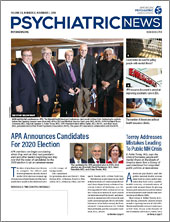With the aid of $17 million in private funds, Johns Hopkins University has launched a center to explore the potential of psychedelic compounds such as psilocybin (magic mushrooms) and 3,4-methylenedioxymethamphetamine (MDMA, or ecstasy) for the treatment of psychiatric disorders.
“Psychedelics are fascinating compounds that can produce a profound change in one’s consciousness just a few hours after being taken,” said Roland Griffiths, Ph.D., the center’s director. Griffiths is a professor of psychiatry and behavioral sciences at Johns Hopkins School of Medicine. Studies both modern and historic have suggested these mind-altering properties can be used in the treatment of mental and substance use disorders.
Researchers in the United States have been limited in their ability to study psychedelics for decades, after the drugs were classified as Schedule I controlled substances beginning in 1970. Schedule I drugs are considered harmful, prone to abuse, and without medical value, and thus government dollars to study these agents have been sparse. Nonetheless, Griffiths and others have been able to conduct studies by cobbling together funding from small federal grants as well as private sources.
The $17 million donation to the Hopkins center is expected to provide five years of operational funding for the center’s researchers and staff, which include neuroscientists, psychologists, and clinicians. The center will also train graduate and medical students.
“This represents the largest investment to date in psychedelic research, as well as in training the next generation of psychedelic researchers,” said donor Tim Ferriss, an author and technology investor, in a press statement. “I sincerely hope this ambitious Johns Hopkins center will inspire others to think big and establish more psychedelic research centers in the U.S. and overseas, as there’s never been a better time to support such important work.”
The establishment of the psychedelic center at Hopkins “is a significant development that adds credibility to this field of research,” said Charles Grob, M.D., a professor of psychiatry and pediatrics at the University of California, Los Angeles (UCLA), and one of the pioneers of psychedelic research in the United States. “Hopkins is one of the strongest medical institutions in the country and the place where modern medicine was established at the turn of the 20th century,” continued Grob, who is not involved in the center. He acknowledged he has his own history at Hopkins: He was born at the hospital and trained there as well.
Researchers at the Center for Psychedelic and Consciousness Research at Johns Hopkins will initially focus exclusively on psilocybin and initiate clinical studies for a range of psychiatric conditions:
•
Matthew Johnson, Ph.D., the associate director of the center, will launch a pair of clinical studies exploring psilocybin as a treatment for opioid use disorder and posttraumatic stress disorder.
•
Frederick Barrett, Ph.D., an assistant professor of psychiatry and behavioral sciences, will conduct a clinical study examining psilocybin as a treatment for alcohol use disorder in people with depression. He will also look for blood-based biomarkers that might predict a person’s response to psychedelics.
•
Albert Garcia-Romeu, Ph.D., an instructor of psychiatry and behavioral sciences, will lead two clinical trials: one testing psilocybin’s effects on depression and anxiety in people with Alzheimer’s disease, and the other testing psilocybin’s effects on psychiatric symptoms including depression or lability (rapid mood swings) in people with Lyme disease.
•
Natalie Gukasyan, M.D., a psychiatrist at Hopkins, will lead a study testing psilocybin as a treatment for anorexia nervosa.
“These will all be early stage studies,” Griffiths noted. “Any phase 3 research will have to be undertaken by bigger groups, but we will be happy to pass the baton.”
Griffith said he thinks it will still be at least five years before any psychedelic would receive broad FDA approval—though there might be some limited exemptions to use these substances in compassionate care for people with advanced illnesses—as there are still a lot of unknowns about these powerful agents.
“We have to learn from some of the mistakes of the past by understanding the good, the bad, and the ugly of psychedelics,” Johnson said. He noted that he believes it’s important that psychedelic research proceeds cautiously and not follow the trajectory of medical cannabis, in which science is trying to catch up to policy. “Yes, there is medical potential [for psychedelics], but these substances do have risks and we would never encourage any non-supervised use at home.”
“We need to follow the data,” Griffiths agreed. “But with this center we have the opportunity to collect that data and slowly bring the potential of psychedelics to bear.”
Grob hopes that this new Johns Hopkins Center will spur even more investment in psychedelic research, even if not at the scale of a research center. He noted that there are other places besides Johns Hopkins and UCLA conducting clinical studies with psychedelics, such as New York University, “but it’s important that this kind of research be as broad as possible,” he said. “This way we can get data on a range of populations that differ in geography, ethnicity, and socioeconomics.” ■

